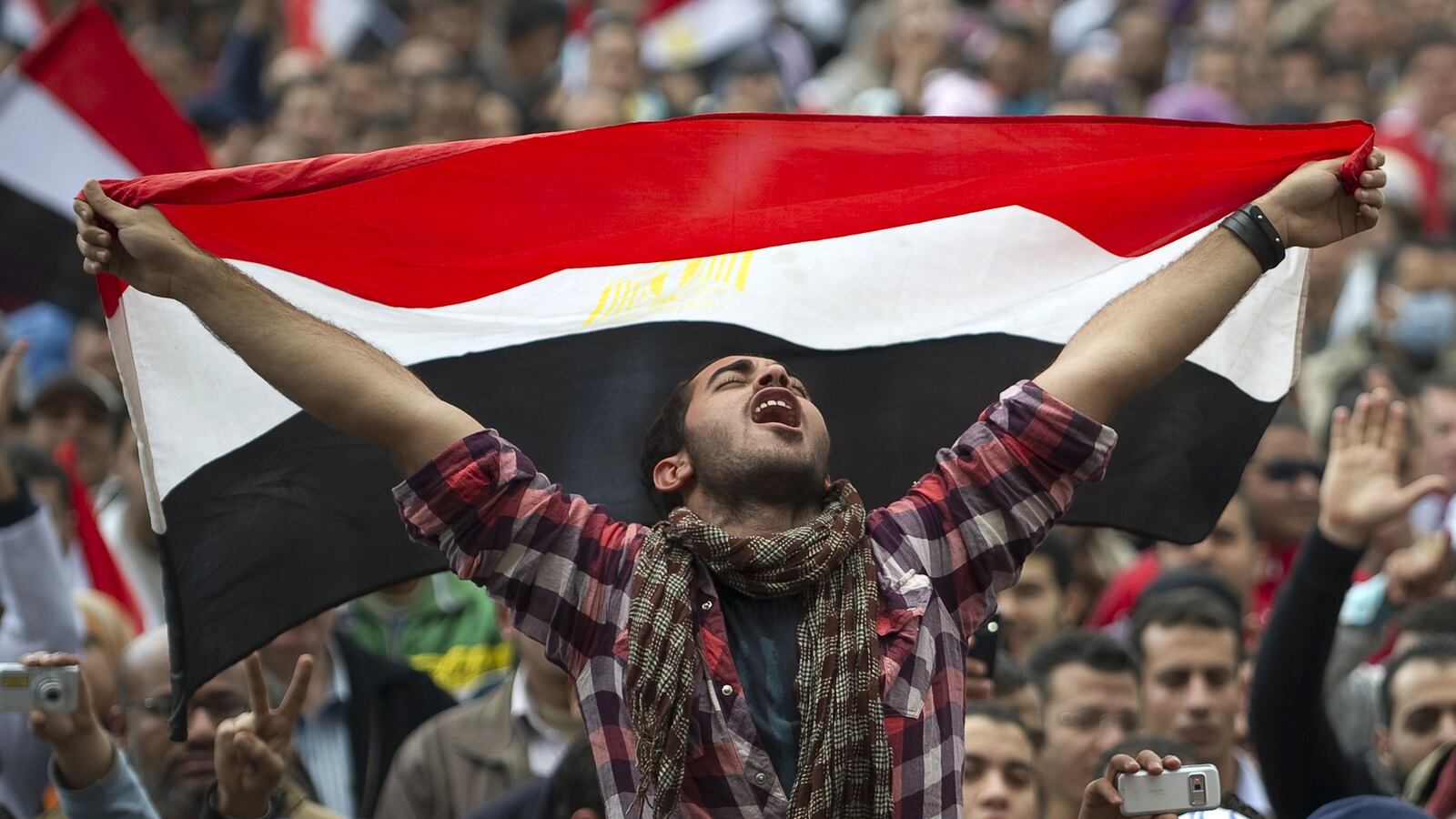They hate our freedom. They want our freedom. They want the U.S out of their lands. They want the U.S. to step in and help tear down tyrants.
All too often, these answers to the question of what motivates people in the Arab world only prove how little we know and understand.
Offered as a sort of corrective to the tired, sweeping clichés of the Middle East is a new book from the prolific blogger and University of Michigan historian Juan Cole, The New Arabs: How the Millennial Generation Is Changing the Middle East.
In his book, Cole looks at youth movements in three of the countries in the center of the Arab Spring—Libya, Tunisia, and Egypt. He examines not only why they rebelled, but also how. He traces the activities primarily of liberal, secular, and daring bloggers in the run-up to, during, and after the revolutions.
As a blogger himself who has relied on many of the bloggers he writes about, Cole is certainly biased toward their influence. However, it is refreshing to see an account for a major world event that focuses not on what the “great men” did or didn’t do, but the oft-faceless hundreds working assiduously for their freedom. Cole has managed to introduce young men and women whose courage and beliefs would cause any former hippie complaining about millennials’ lack of activism to clam up.
“The thing that surprised me the most,” Cole explains in an interview with The Daily Beast, “was the originality of the thinking. That these people in their early 20s and mid-20s were demonstrating.”
One young female activist in Tunisia, Amira Yahyaoui, tells Cole one of her major influences was Etienne la Boétie’s 1548 essay, “Discourse on Voluntary Servitude,” on ending tyranny. She also references Slawomir Mrożek’s absurdist play Tango.
A counterpart to her in Egypt was the blogger Shahinaz Abdel Salam, who cites Simone de Beauvoir’s book on the Algerian freedom fighter Djamila Boupacha.
Then there are the bloggers who posted videos of police torture (Wael Abbas), those who ran blogs in the face of arrest and imprisonment (Zouhair Yahyaoui), or those who called for demonstrations year after year until the country was finally ready (Asmaa Mahfouz).
A lot of these activists were interested in what Cole calls “the dignity and autonomy of citizens with regard to their bodies.” In the U.S. this concept usually comes up in the abortion debate—in these countries it was a battle against torture and police brutality.
Once Cole gets going (and there’s definitely some academic throat clearing) the value of the book becomes apparent in the depth it provides to the simplistic, sound bite-ready explanations for the Arab Spring.
For instance, it wasn’t just “the Internet,” Facebook, or Twitter that precipitated revolution. Social media did play a major role. But Cole also points to the proliferation of phones with video capabilities as a turning point. The phones were used to document police brutality and torture (which he argues was a major driver of revolutionary sentiment). Whereas before, torture was real only in the form of fearful whispers and rumor, it now was documented and ready for dissemination via phone, social media, video sites, and the blogosphere.
Avoiding generalized theories as to why the Arab Spring happened in these countries, Cole offers a productive look inside the worldviews and values shaping those fashioning these events.
One commonly cited reason for the uprising was the combination of an economic downturn with a youth bulge in the Arab world. According to Cole, more than a third of the Arab world’s population is made up of millennials. What is considered distinct about the Arab youth bulge is that at the same time they faced staggering rates of unemployment, they were significantly more urban and literate than the preceding generation. This led to widespread unrest among a population that not only had access to information from the outside world, but the ability to analyze and spread it.
However, what distinguishes Cole’s writing about the youth bulge is the way in which he ties it into one of the more unfamiliar aspects of the Arab Spring—the importance of years of protest organizing before the revolution.
To the casual observer, the Arab Spring seemed to come from nowhere. It was an extemporaneous uprising triggered by a Tunisian street vendor who set himself on fire—the proverbial straw that broke the camel’s back.
In talking to many of the activists, Cole came to see that organized protests over the invasion of Iraq and the 2008 Israel-Gaza conflict also played a major role. Just as indispensable was a decade’s worth of labor organizing over economic issues.
“In some ways, it was the invasion of Iraq that often produced the first big street demonstrations that these young people were involved in,” explains Cole. “But then the Gaza War in 2008-9—that surprised me in the sense that it seems to have been a really big rallying point for the Tunisian youth.”
The hot-button foreign policy issues kick started interest in protests and blogs, and in Egypt in particular, he says, “blogs just started going off on Mubarak in ways that are surprising.”
Domestic issues also galvanized the activists. Here Cole stresses the importance of the rise of organized labor. According to Cole, between 2004 and 2010, Egyptian workers staged roughly 3,000 strikes and labor actions. In 2006, there was the strike at the factories in El Mahalla El Kubra which saw 27,000 to 54,000 workers go on strike. As Egypt’s population exploded, so too did tensions over water. And resentment over corruption only increased as that widespread problem exacerbated other problems.
Two years later, workers, bloggers, and activists pushing for a higher minimum wage gave birth to the famous April 6 strike, which in turn gave rise to the famous April 6 Youth Movement. That youth group was a key part of protests against Mubarak. Indeed, their power is perhaps best illustrated by the fact that after they also led the overthrow of Mohamed Morsi, they were banned in April 2014.
To say that the aftermath has been messy would be an understatement. Egypt elected its president from the Muslim Brotherhood, only to see a counter-revolution reinstate a member of the military. Violence has raged in Libya, and on June 27, a prominent female activist was assassinated during parliamentary election. Tunisia, while faring better than the other two, saw an Islamist party come to power in the first election as well as the assassination of two secular opposition leaders. It now has a new constitution and will hold its first parliamentary and presidential elections this fall.
“I don’t mean to put the poor things down, but it’s just not what they’re into,” says Cole when asked what the activists have done in terms of politics since the revolution. “It’s like asking a novelist to write poetry or something. It’s just not their thing.”
In the run-up to Egypt’s 2011 parliamentary elections, for instance, Cole talked to those same April 6 activists about whether they were organizing or had candidates.
“They looked at me funny,” he says. “They said, ‘Well, isn’t that what a political party would be doing?’” They conceive of themselves not as a political party, he explains, but “more like our Greenpeace. But even less politically savvy.”
Part of the issue has to do with age. Many of the prominent activists before and during the revolution were college students or graduate students and were not old enough to run for office.
But there was an even bigger factor, which Cole argues led to the Muslim Brotherhood’s rise.

“These were police states and you weren’t allowed to form a party at will, you had to be part of the system or you’d be shut down,” he says. “So nobody had any experience in doing this kind of thing except for a few of the older parties that had somehow gotten permission from the regime to operate.”
One of those parties was the Brotherhood, which not only had an organizational structure but for years had been allowed to run its members for election under other small-party banners. In the aftermath then, it wasn’t just that the political actors were older than many of the young activists. “[The politicians] grew up at a time where either you idolized Nasser and you liked the military kind of authoritarianism, or you idolized the Muslim Brotherhood,” says Cole. “So it’s no surprise that that’s what politics is in the aftermath. It’s these baby boomers fighting it out between the nationalists and the Muslim fundamentalists.”
Cole’s book is not a definitive history. (Nor, I suspect, is it intended to be.) Instead, it’s more like stepping into the journal of somebody who says, in effect, here are the people I talked to, and here’s what they believe.
In many ways, that’s much better than the wearisome pontificating from cable news and editorial pages.






